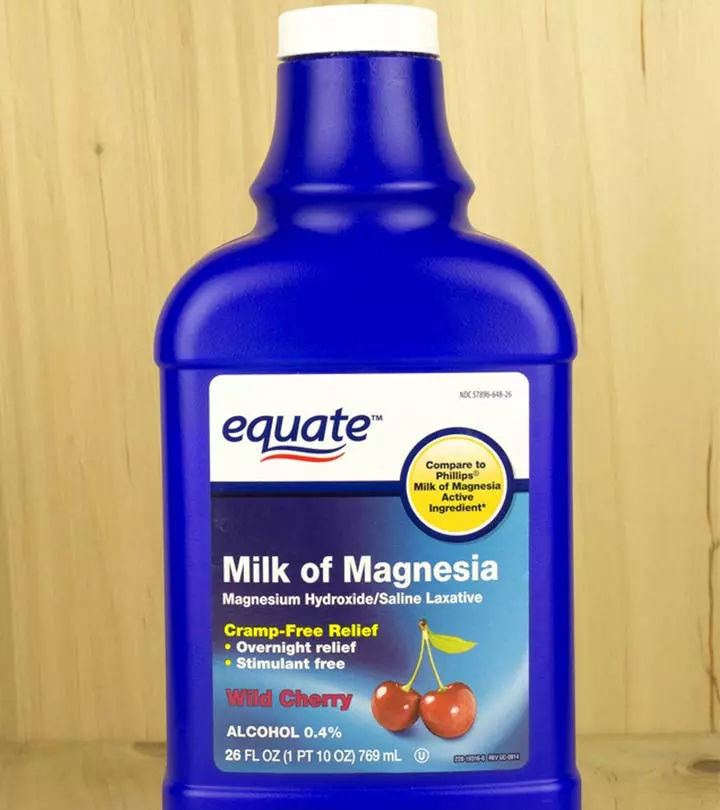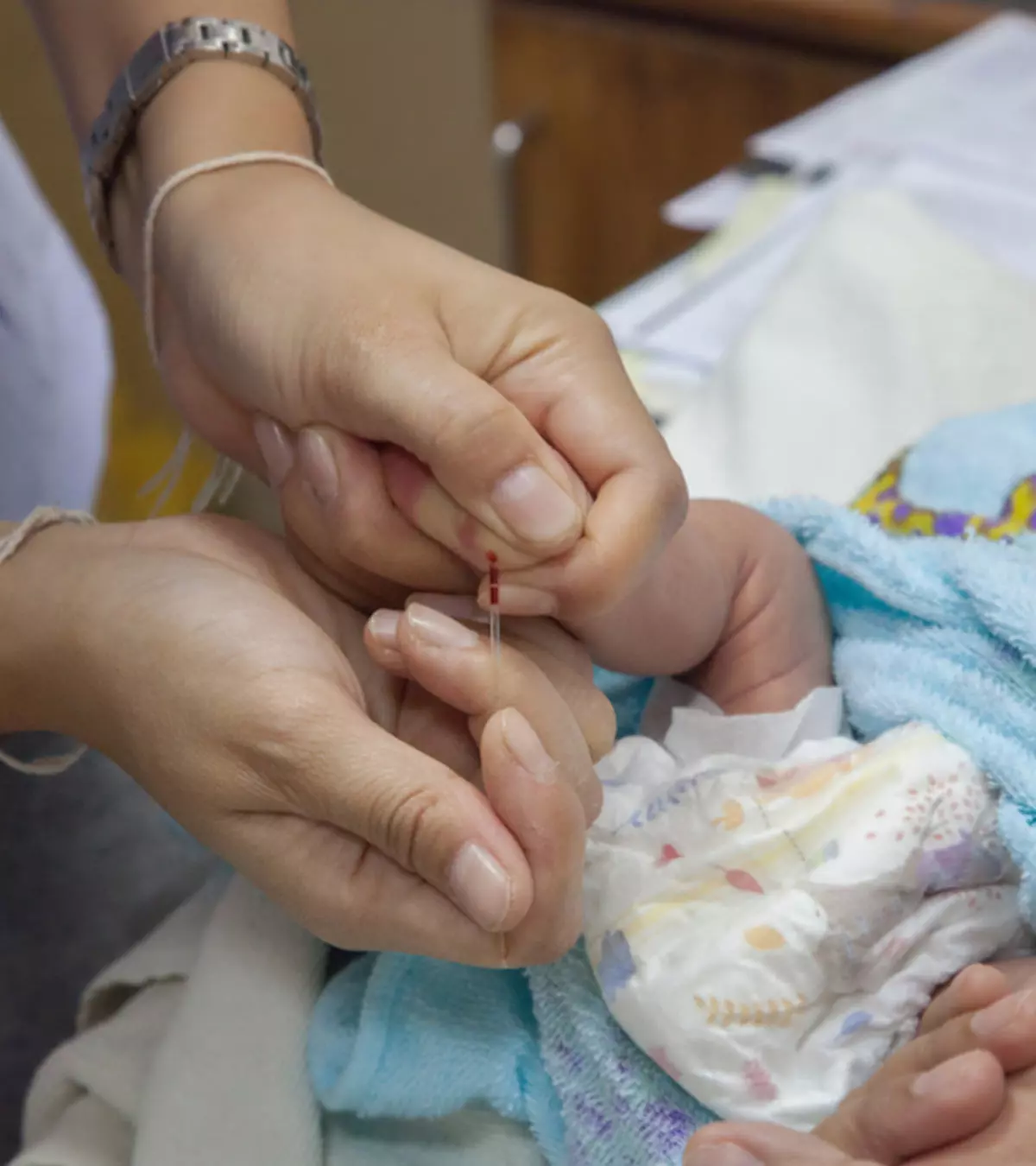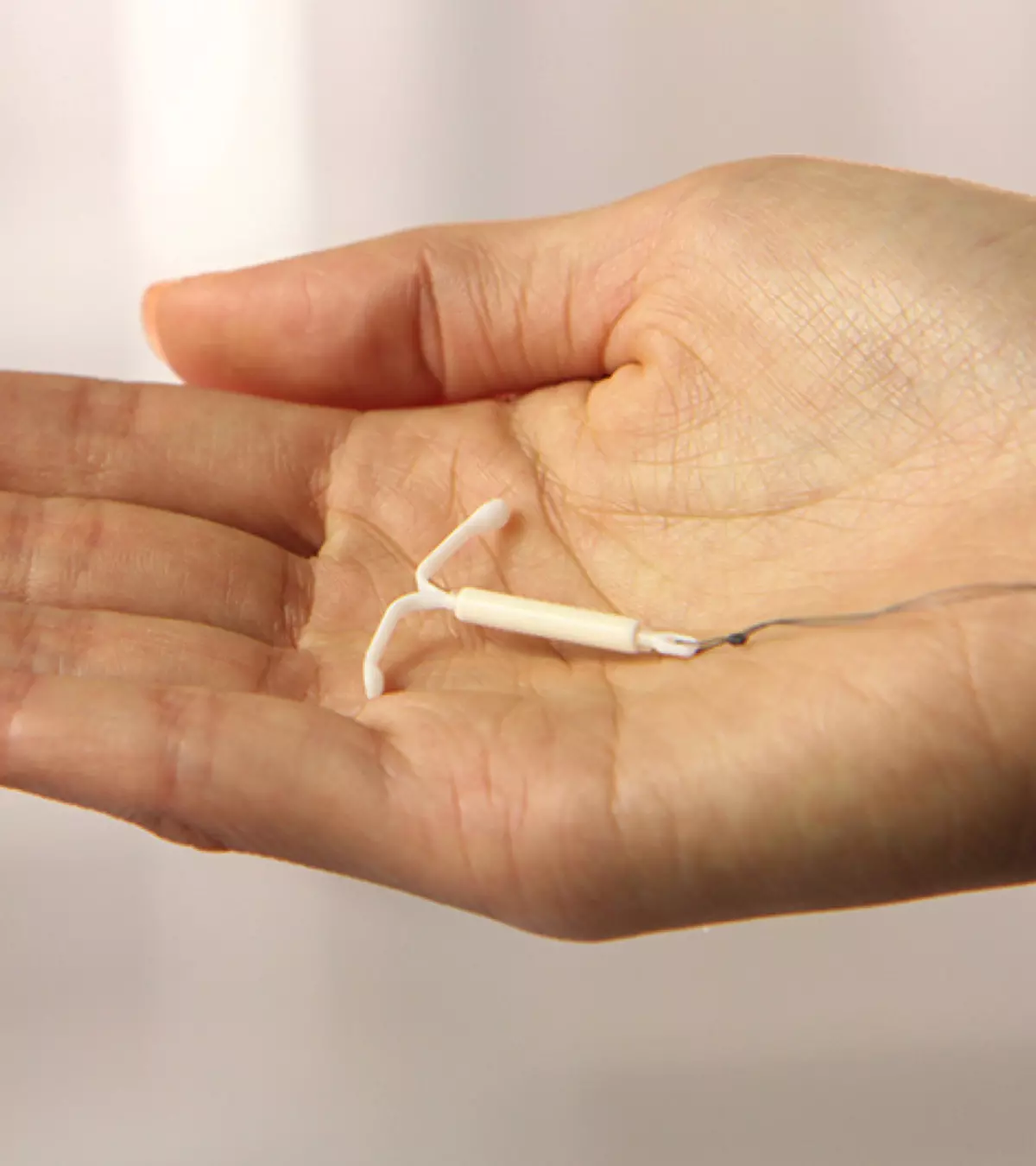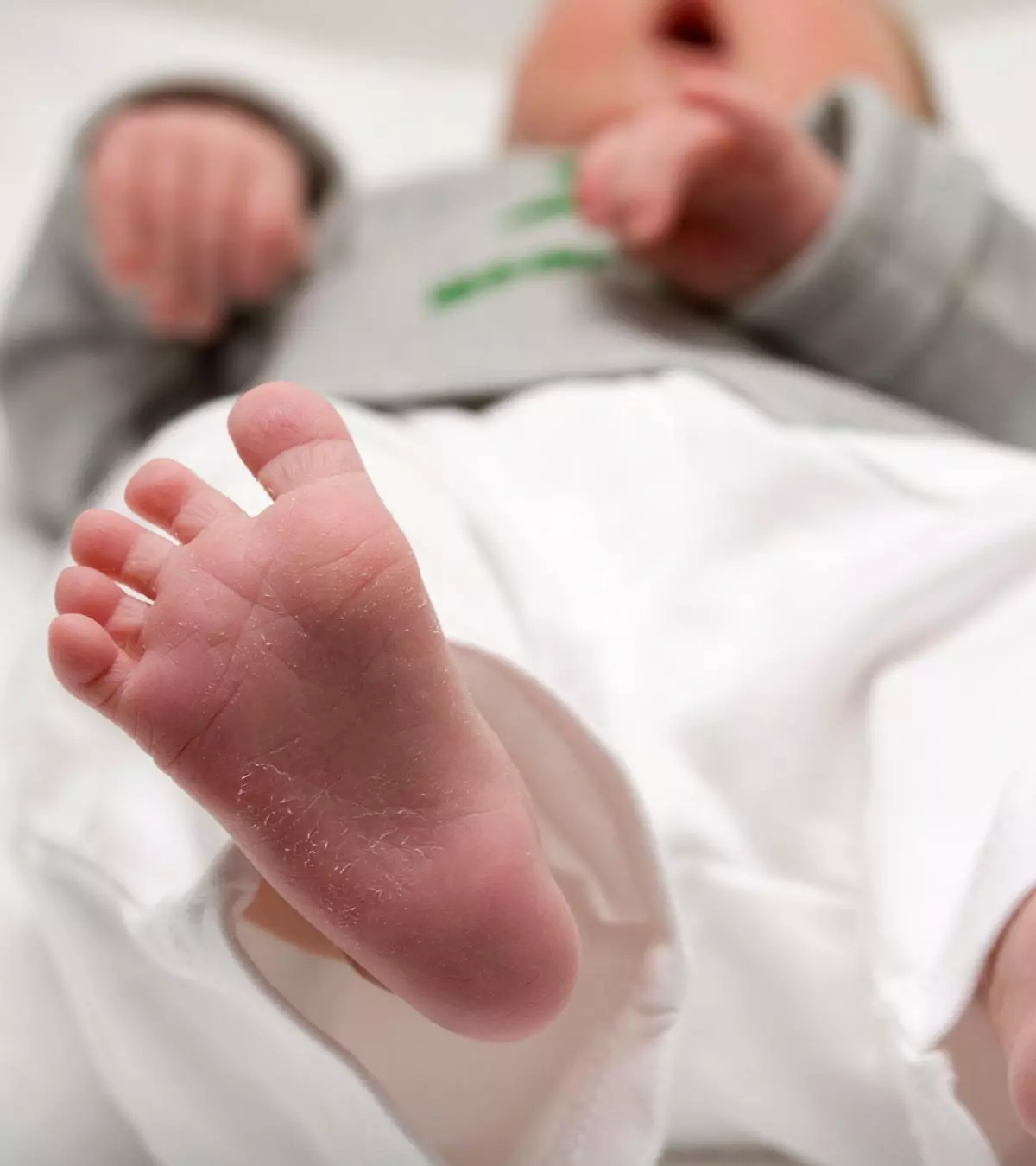
Image: Midjourney/ MomJunction Design Team
White curds in baby poop may be concerning for new parents, but they are often harmless and can indicate normal digestive processes. The undigested fat globules of breast milk may be passed along with the excretion of poop in breastfed babies. Formula-fed babies may also experience the same symptoms. Medical attention is suggested if your baby shows symptoms of an allergic condition or other disorders along with poop discoloration.

Read this post to learn about the possible causes of white curds in baby poop and signs that suggest the need to see a doctor.
Key Pointers
- White curds in the feces of newborns who are breastfed or fed formula are very common.
- White curd in baby poop can be caused by undigested food, food allergies, or sickness.
- Consult your pediatrician if you notice pale yellow or gray poop in babies along with feces containing milk curds.
- If your baby exhibits lactose intolerance signs such as wheezing, vomiting, or fussiness shortly after feeding, contact your pediatrician immediately.
Causes Of White Chunks In Baby Poop
The appearance of white chunks in the poop of breastfed or formula-fed babies is fairly normal. These chunks may have a cottage cheese-like appearance and are prominently seen in a breast-fed baby’s poop (1). They may be clumps of undigested milk fat or undigested excess breast milk or formula protein that is curdled (2).
Dr. Cindy Rubin, MD, IBCLC, a board-certified pediatrician and breastfeeding specialist from Westchester, Illinois, says, “White cottage cheesy chunks or curds in baby poop are not uncommon. We see this a lot, especially in breastfed babies but it can be in formula-fed babies. Poops change so frequently in babies that the colors could be almost anything in the rainbow.”
Other common reasons for white curd in infant poop are (3) (4)
- Undigested food: If your baby has started consuming solid food, the white chunks in their poop may be undigested bits of food. It happens because babies cannot chew properly, and their digestive system is still adapting and developing as they grow and are introduced to new foods. As they grow, their digestive system begins producing more enzymes to break down fats and proteins, their gut becomes more selective about what can pass through its walls, and enzyme production continues to increase, solving such digestive issues (5) (6). Dairy or high-fat foods, and an all-milk diet, in particular, can cause white curds in a baby’s poop. Therefore, it is important to observe how your baby’s poop changes with different food to identify the potential food causing it (7).
 Quick tip
Quick tip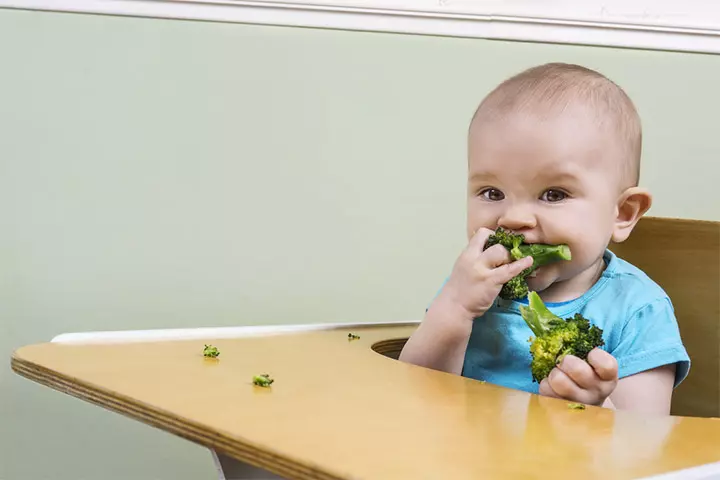
- Infection/illness: Although it is uncommon for breastfed baby poop to be lumpy or have white chunks because of food allergy or illness, you cannot rule out this possibility. If you notice signs of irritability, fever, pale or whitish frothy stool texture, and uncontrollable crying, consult your doctor.
Symptoms That May Accompany White Curds In Baby Poop

Although it is normal for babies to discharge stool containing milk curds, consult your pediatrician if you notice the following symptoms as well.
- Pale poop: Pale yellow or gray poop may signify that the baby’s liver is not producing enough bileiA yellowish-green fluid produced by the liver that helps digest fats and gives poop its brown color. (9).
- White poop: Grayish or white poop in babies could indicate a blocked liver or biliary atresiaiA rare condition where the bile ducts (tubes that carry bile from liver) are blocked or absent from birth. (10). Though these conditions are rare in newborns, they should not be ruled out and require emergency evaluation by a doctor.
Samantha Melaney, a mother of two, shares the symptoms she noticed in her daughter, who was later diagnosed with biliary atresia. She recalls, “By the time she was four weeks old, she was throwing up constantly. Her stools were unusual—very foamy and a light yellow or whitish color…During her two-month routine checkup on December 11, 2015, the pediatrician immediately noticed something was off and asked, ‘Does she look yellow to you?’ I wasn’t sure because I was always looking at her, and it was hard to tell. During that visit, she threw up three times, which was typical for how much she was vomiting at home. The doctor noticed she hadn’t grown at all in the past two months, which raised concerns. They ran some labs and sent us home, saying they would call with the results…Shortly after, we were told she likely had biliary atresia, a rare liver disease (i).”
Other Colors Of Baby Poop
The color of normal baby poop varies as they grow, depending on their food, bowel movement and function, and gut health. However, some common colors of normal poop are as follows (11) (12):
- Black poop: Also known as meconium, this is the baby’s first poop after birth. Black poop in babies contains all the substances that the baby ingested while in the womb.
- Yellow poop: Your baby’s poop will eventually look yellowish and grainy in the first week after birth.
 Be watchful
Be watchful- Green poop: Once your baby starts consuming solids, the color of their poop may change depending on what they eat. Greenish poop in infants signifies a diet rich in iron or iron supplements or can be due to green leafy vegetables.
- Brown poop: It signifies healthy digestion with no cause of worry.
- Red poop: If your child had anything containing food colors or beetroots, red poop is normal. However, if you notice specks of blood in the poop, consult your doctor as it may be a sign of constipation.
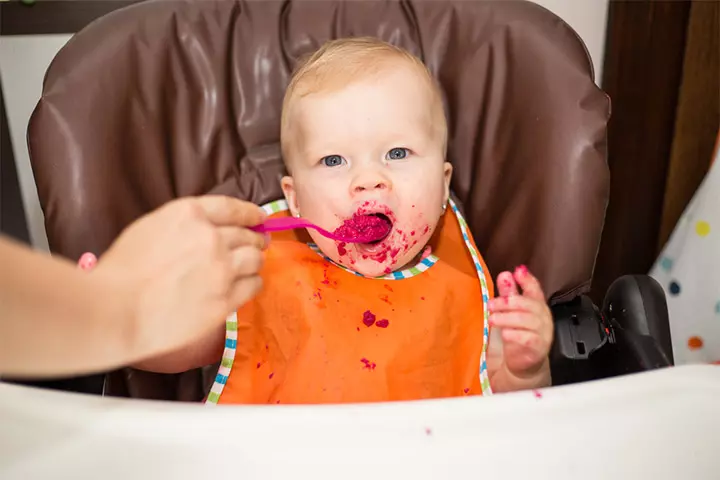
When To Call A Doctor

Image: Shutterstock
White chunks in baby poop are not a cause for concern. Dr. Rubin adds, “Pediatricians will only truly worry about bloody (red), pitch black (digested blood), or stark white (problem with the liver) poop. The white would need to be throughout the whole poop for it to be worrisome, not just little chunks. Frequently monitor the baby poop color, if you see those colors, you should call your doctor right away. I would only worry about food intolerance if the baby is eating poorly, seems in pain with or after eating, or isn’t gaining weight well.”
However, consult your healthcare provider if the following signs accompany it (13) (14):
- Diarrhea with blood specks in the poop
- Gassiness
- Pain in the stomach or abdomen
- Pale yellow, white, or clay-colored poop
- Lactose intoleranceiA condition where the body cannot properly digest lactose (the natural sugar in milk). symptoms such as belly bloating, excess gas, or abdominal pain
- Symptoms of a milk allergy, such as wheezing, vomiting, and fussiness after feeding
- Frothy poop-like consistency with mucus in baby stool
 Quick tip
Quick tipFrequently Asked Questions
1. Do food allergies cause white chunks in my baby’s poop?
There is no evidence that food allergies cause chunks in baby poop. Food allergies in babies can be associated with diarrhea, blood, vomiting, skin rashes, colic or abdominal discomfort, and breathing difficulties (15).
2. What to do about white chunks in baby poop?
Look for the coexisting signs and symptoms when your baby has white cottage cheese-like chunks in poop. If they are healthy and not fussy or irritated, it can be undigested breast milk or other foods in already weaning babies. Liver problems can also cause white stool in babies due to a lack of bile. You should seek a pediatrician’s consultation in such cases.
Whether your little one is breastfed or formula-fed, you may sometimes notice white curds in baby poop. Most commonly, this is a sign of undigested milk residue or fat and will eventually go away as your baby grows and their digestive system develops. However, do not ignore this symptom if it is accompanied by white or pale poop, as it may indicate liver problems. Also, consult your healthcare provider promptly if your baby develops signs of diarrhea with blood in their poop, gas, or abdominal pain.
White baby poop, though not of a regular occurrence, could indicate an underlying medical problem such as a liver problem when frequent. Here is an infographic describing the normal and abnormal signs associated with an infant’s white stools and when to seek medical help.
Some thing wrong with infographic shortcode. please verify shortcode syntax
Personal Experience: Source
MomJunction articles include first-hand experiences to provide you with better insights through real-life narratives. Here are the sources of personal accounts referenced in this article.
i. Kendyl’s Story of Biliary Atresia.https://www.youtube.com/watch?feature=shared&v=cyH-ZY864Y4
References
- Baby poo – what’s normal?
https://www.breastfeeding.asn.au/resources/baby-poo-whats-normal - Robert L Beverly et.al; (2019); Milk Peptides Survive In Vivo Gastrointestinal Digestion and Are Excreted in the Stool of Infants.
https://pmc.ncbi.nlm.nih.gov/articles/PMC7138664/ - We’ve got the scoop on poop.
https://www.chla.org/blog/advice-experts/weve-got-scoop-poop - Toddler’s diarrhea.
https://www.mottchildren.org/posts/your-child/toddlers-diarrhea - Evan Abrahamse et.al; (2012); Development of the Digestive System—Experimental Challenges and Approaches of Infant Lipid Digestion.
https://pmc.ncbi.nlm.nih.gov/articles/PMC3528963/ - Poop Scoop.
https://kodiakkindness.org/the-poop-scoop/ - Your child’s poop: An ultimate guide.
https://health.choc.org/your-childs-poop-an-ultimate-guide/ - Starting Solid Foods.
https://www.healthychildren.org/English/ages-stages/baby/feeding-nutrition/Pages/Starting-Solid-Foods.aspx - What Can Your Child’s Poop Color Tell You?
https://www.hopkinsmedicine.org/health/conditions-and-diseases/stool-color-guide - Symptoms & Causes of Biliary Atresia.
https://www.niddk.nih.gov/health-information/liver-disease/biliary-atresia/symptoms-causes - The color of baby poop and what it means.
https://health.clevelandclinic.org/the-color-of-baby-poop-and-what-it-means-infographic - Baby Poop Guide.
https://www.childrenscolorado.org/just-ask-childrens/articles/baby-poop-guide/ - Milk Allergy in Infants.
https://kidshealth.org/en/parents/milk-allergy.html - Lactose intolerance in babies.
https://www.healthywa.wa.gov.au/Articles/J_M/Lactose-intolerance-in-babies - Infant Allergies and Food Sensitivities.
https://www.healthychildren.org/English/ages-stages/baby/breastfeeding/Pages/Infant-Allergies-and-Food-Sensitivities.aspx
Community Experiences
Join the conversation and become a part of our nurturing community! Share your stories, experiences, and insights to connect with fellow parents.
Read full bio of Dr. Jessica Madden

Dr. Cindy Rubin is a pediatrician and breastfeeding medicine specialist practicing in the Western Suburbs of Chicago. She did her undergrad at Stanford University, medical school at Georgetown, and pediatrics residency at the University of Chicago. After working at Loyola University Medical Center as an outpatient general pediatrician for 13 years, she opened her new practice, In Touch Pediatrics and Lactation.
Dr. Cindy Rubin is a pediatrician and breastfeeding medicine specialist practicing in the Western Suburbs of Chicago. She did her undergrad at Stanford University, medical school at Georgetown, and pediatrics residency at the University of Chicago. After working at Loyola University Medical Center as an outpatient general pediatrician for 13 years, she opened her new practice, In Touch Pediatrics and Lactation.
Read full bio of Sanjana Bhattacharjee
Read full bio of Rohit Garoo
Read full bio of Ghazia Shah








